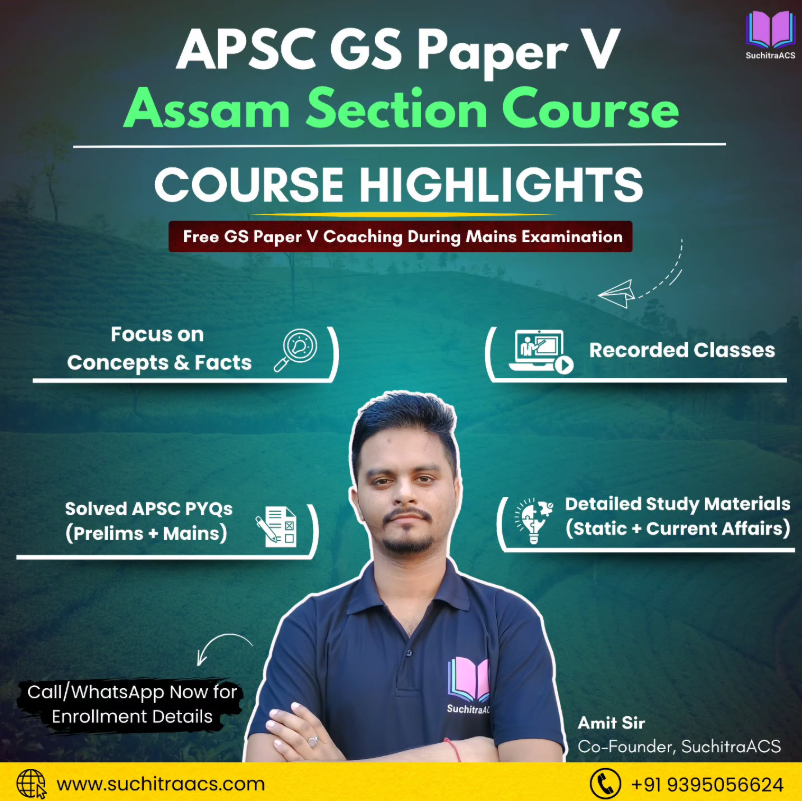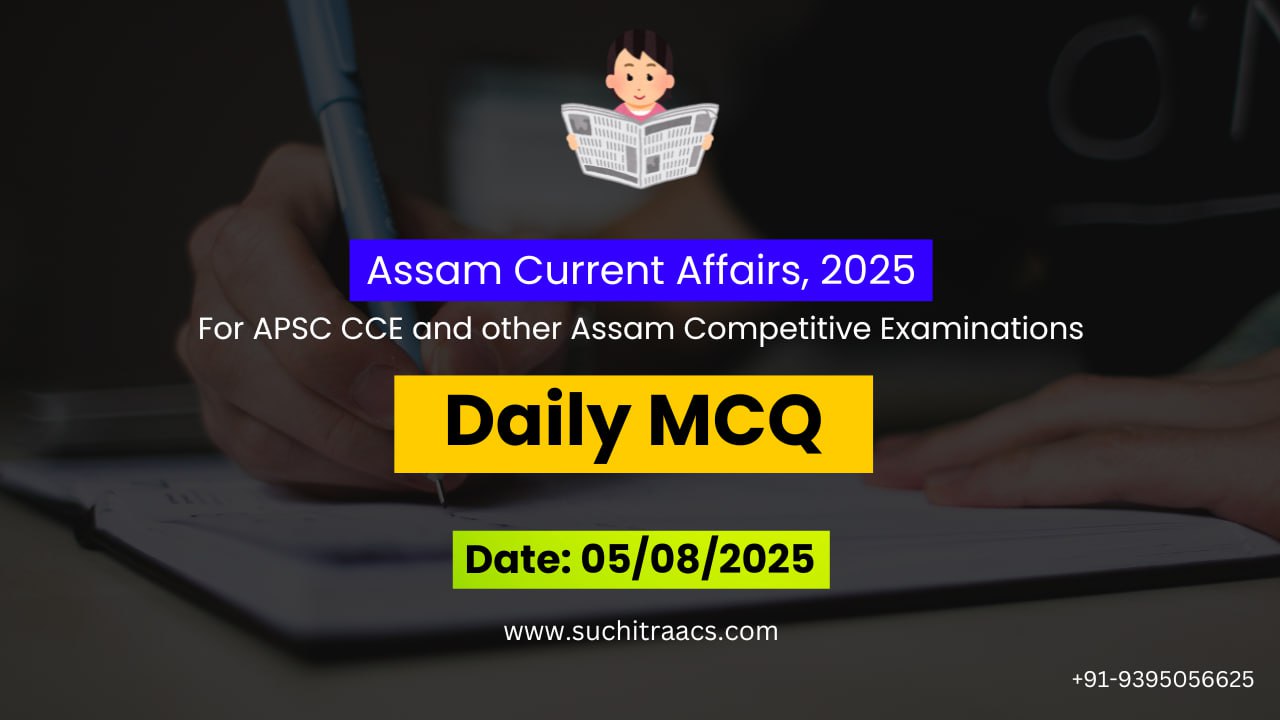APSC MCQs / APSC Prelims Practice Questions based on Assam Tribune (Daily) –05/08/2025
For APSC CCE and other Assam Competitive examinations aspirants, practicing Daily MCQs is vital. This blog covers most important Prelims questions from the Assam Tribune today (05-08-2025). These issues are key for both APSC Prelims syllabus, offering insights into the important topics of current affairs.
✨ APSC CCE Online Coaching, 2026

APSC MCQs / APSC Prelims Practice Questions (Date: 05/08/2025)
🧭 Topic 1: China’s Mega Dam near the Great Bend of the Brahmaputra
Q1. Consider the following statements regarding transboundary river projects:
- The Brahmaputra River originates in Bhutan and flows through India before entering Bangladesh.
- The Upper Siang project is a proposed Indian initiative to counter potential hydrological threats from Chinese dams.
- India has a legally binding water-sharing treaty with China on the Brahmaputra.
Which of the statements given above is/are correct?
A. 1 only
B. 2 only
C. 1 and 3 only
D. 2 and 3 only
Answer: B. 2 only
🧠 Explanation:
- Statement 1 is incorrect: The Brahmaputra originates as the Yarlung Tsangpo in Tibet, not Bhutan.
- Statement 2 is correct: Upper Siang project in Arunachal is proposed by India to mitigate effects of China’s mega dam.
- Statement 3 is incorrect: India and China do not have a water-sharing treaty; only a limited hydrological data-sharing MoU exists.
Q2. The term “Great Bend” is often mentioned in geopolitical discussions involving India and China. It refers to:
A. A sharp turn of the Brahmaputra river in Bhutan
B. A Himalayan pass through which Chinese troops moved in 1962
C. A U-shaped turn of Yarlung Tsangpo before it enters India
D. A tectonic boundary along the Karakoram range
Answer: C. A U-shaped turn of Yarlung Tsangpo before it enters India
🧠 Explanation:
The Great Bend is a dramatic U-turn in Tibet where the Yarlung Tsangpo (upper Brahmaputra) curves around Namcha Barwa mountain before entering India as Siang.
🌳 Topic 2: Illegal Diversion of Reserve Forest Land in Assam
Q3. With reference to forest governance in India, consider the following:
- As per the Forest (Conservation) Act, 1980, no forest land can be diverted for non-forest use without prior approval from the Central Government.
- The Van (Sanrakshan Evam Samvardhan) Rules, 2023 allow state governments to independently clear forest land for security installations.
- Reserve Forests are notified under the Indian Forest Act, 1927.
Which of the statements given above is/are correct?
A. 1 and 3 only
B. 2 only
C. 1 and 2 only
D. 1, 2 and 3
Answer: A. 1 and 3 only
🧠 Explanation:
- Statement 1 is correct: FCA mandates central approval for diversion.
- Statement 2 is incorrect: The 2023 Rules do not give states unilateral power.
- Statement 3 is correct: Reserve forests are notified under the Indian Forest Act, 1927.
Q4. Which of the following best describes the legal principle of “non-derogation” in environmental jurisprudence?
A. Environmental laws should not be amended without Parliamentary scrutiny.
B. Once environmental protection is legislated, it cannot be diluted to favor developmental priorities.
C. Forest dwellers have unconditional rights under Article 21.
D. The judiciary must always favor tribal rights in forest cases.
Answer: B. Once environmental protection is legislated, it cannot be diluted to favor developmental priorities.
🧠 Explanation:
Non-derogation means legal protections, especially in environmental contexts, cannot be diluted or reversed, even by executive order or expediency.
🌾 Topic 3: Assam’s Eviction Drives and Land Encroachment
Q5. Match the following categories of land in Assam with their primary characteristics:
| Type of Land | Feature |
| A. Village Grazing Reserve (VGR) | 1. Reserved for specific occupational groups’ grazing rights |
| B. Professional Grazing Reserve (PGR) | 2. Community-owned land used for cattle and livestock |
| C. Satra Land | 3. Cultural and religious land associated with Vaishnavite monasteries |
| D. Forest Land | 4. Protected under Forest Conservation Act, 1980 |
Correct Match:
A – 2, B – 1, C – 3, D – 4
Answer: ✔️ Correct
🧠 Explanation:
- VGRs = community livestock grazing
- PGRs = reserved for professional groups (e.g., herders)
- Satras = Vaishnavite institutions
- Forest Land = FCA protection
Q6. In the context of NRC and illegal immigration in Assam, consider the following statements:
- The National Register of Citizens (NRC) in Assam is monitored by the Election Commission of India.
- Inclusion in NRC automatically confers Indian citizenship.
- Assam Accord (1985) set the cut-off date for detection of illegal migrants as 24 March 1971.
Which of the above statements is/are correct?
A. 1 and 2 only
B. 2 only
C. 3 only
D. 2 and 3 only
Answer: C. 3 only
🧠 Explanation:
- Statement 1 is incorrect: NRC is supervised by the Registrar General of India, not the Election Commission.
- Statement 2 is incorrect: Inclusion in NRC does not automatically confer citizenship; it only establishes eligibility.
- Statement 3 is correct: As per Assam Accord, 24 March 1971 is the legal cut-off.
🚶♀️ Topic 4: Foot Overbridges along NH-27 in Guwahati
Q7. Consider the following advantages of constructing Foot Overbridges (FOBs) in urban areas:
- They reduce pedestrian-vehicle conflict and road accidents.
- They contribute directly to the reduction of ambient air pollution.
- They are mandatory under the Indian Roads Congress (IRC) guidelines for every state capital.
Which of the above is/are correct?
A. 1 only
B. 1 and 2 only
C. 1 and 3 only
D. 1, 2 and 3
Answer: A. 1 only
🧠 Explanation:
- Statement 1 is correct: FOBs reduce accidents by separating pedestrian and vehicular movement.
- Statement 2 is incorrect: Indirect benefits may exist, but not directly proven to reduce air pollution.
- Statement 3 is incorrect: IRC provides guidelines, not a mandatory requirement for every state capital.
Q8. Recently, the NHAI undertook infrastructure upgradation on NH-27 in Guwahati. Which of the following features are associated with NH-27?
- It passes through Assam, West Bengal, Uttar Pradesh, and Gujarat.
- It is part of the Golden Quadrilateral project.
- It includes multiple six-lane upgrades in urban sections like Guwahati.
Select the correct answer using the code below:
A. 1 and 3 only
B. 2 and 3 only
C. 1 and 2 only
D. 1, 2 and 3
Answer: A. 1 and 3 only
🧠 Explanation:
Statement 3 is correct: Guwahati bypass has been upgraded to six lanes recently.
NH-27 connects Gujarat to Assam—Statement 1 is correct.
Statement 2 is incorrect: NH-27 is part of East-West Corridor, not Golden Quadrilateral.
✨ APSC CCE Courses, 2025-26 offered by SuchitraACS


🔔 Join Our WhatsApp Study Group!
For exclusive access to premium quality content, including study materials, current affairs, MCQs, and model answers for APSC CCE and other Assam competitive exams.
Click here to join: SuchitraACS Study WhatsApp Group
📚 Want to know more about SuchitraACS’s most affordable courses?
Click here to know more: SuchitraACS Courses for APSC CCE and Assam Competitive Examinations




